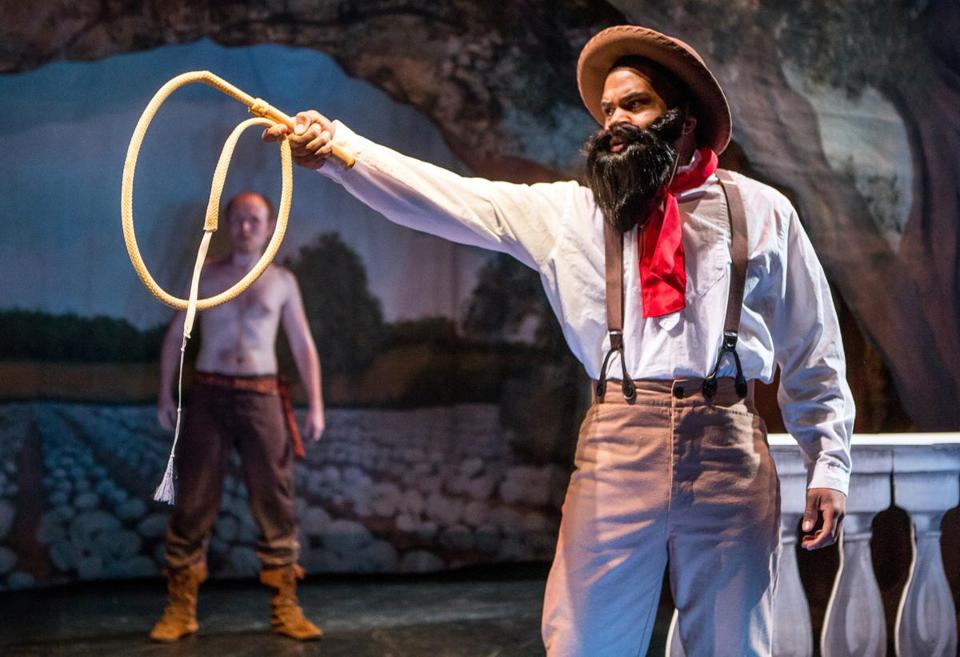Share This:
February 9, 2016 | Theatre,
Why Theatre? Why Melodrama?
I so admire An Octoroon because it directly questions theatre’s relevance inside the very dialogue of the characters while us giving us a fresh and challenging take on the history of race and racism in America. It does this by reclaiming and reinventing the theatrical form of melodrama. Melodrama, an art form that is gaining tremendous popularity in the last few years with the rise of Shonda Rhimes’ well-received television shows Grey’s Anatomy, Scandal, and How to Get Away with Murder, and was a popular 19th century theatrical form employed by 20th century playwrights as diverse as Eugene O’Neill, Stephen Sondheim, and Charles Ludlam. Jacobs-Jenkins is inventing (among a handful of other American playwrights) melodramas for this century.
Melodrama is high emotion, heavy on plot, light on character (characters are usually of an identifiable type), and the story leads us to a place where moral order and virtue will ultimately prevail and evil eventually punished. Good melodramas have murders, threatened poverty, love affairs thwarted, and suicides. You can look for all of these elements in An Octoroon as well as the kind of character transparency that melodramas are known for. Characters will narrate their emotions right to us as the audience, so there are no secrets that we won’t be completely aware of.
In An Octoroon the playwright holds himself to the same standards of his characters as he inserts himself with complete transparency into the plot of Boucicault’s original play.
Jacobs-Jenkins by putting his own emotional context inside the play understands that the form of melodrama has something to tell us about right now, about the dramas that are unfolding on a daily basis on all of our various screens, dramas of a country struggling with the daily news stories and videos of racism and gun violence. How do we make sense of a reality that feels swirling out of control? Melodrama gives us a path toward a transparency of emotion, and as the emotions of our country are so big right now, perhaps it’s only through melodrama that our emotions can be held and we can find a way to express them in the hopes of creating a narrative toward an ever more just and civil society.
Toward the end of Brandon Jacobs-Jenkins An Octoroon, the character BJJ (the playwright of our contemporary moment) is in conversation with the character, Playwright, presumably Dion Boucicault the playwright who wrote The Octoroon in 1859, from which Jacobs-Jenkins has adapted An Octoroon. In the conversation between the two writers they are discussing the traditional practice of using some kind of new technology as spectacle in 19th century melodrama that would have created great surprise in 1859 but will likely feel dated for audiences in 2016.
Playwright: but part of the thrill, part of the Sensation of the scene, was given people back then a sense of having really witnessed something new and novel.
BJJ: And that’s basically impossible for us to do now. If anything, the theatre is no longer a place of novelty. The fact is we can more or less experience anything nowadays.
The conversation begs the question of why theater in 2016? Can theater speak to our contemporary moment in new and novel and surprising ways that will advance our individual thinking and emotions and enhance our lives together as a community, as a city, and as a country? Or are other media enough to tell us everything we need to know about how to feel and to think right now?
An Octoroon makes a strong case that theatre is indeed a place for novelty, the kind of novelty of live presence combined with high emotion that we need right now. We are enthusiastic to be partnering with Company One to bring you this important play that we hope will spark deep and nuanced conversation inside and outside of the theatre.





Leave a Reply